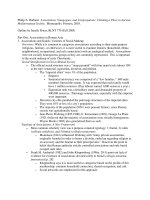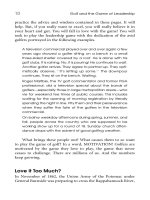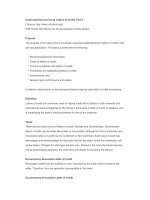Tài liệu Golf and the game of leadership 15 pptx
Bạn đang xem bản rút gọn của tài liệu. Xem và tải ngay bản đầy đủ của tài liệu tại đây (221.59 KB, 10 trang )
130
Golf and the Game of Leadership
There is no guarantee of success on the golf course. There is
no guarantee of leadership success. However, when the expecta-
tions for the game are clearly understood, and the tools of the
game are appropriately applied, chance for golfing success is good.
Similarly, when the leader establishes clear expectations and en-
sures that appropriate tools are available, leadership success is
more readily achieved.
WIN-win
As leaders we need to be realistic about our own expectations of
success. Virtually everything in life is a negotiation. As we dis-
cussed at hole ࠻8, Focus, there is little we can control aside from
ourselves but much we can potentially influence. Ron Shapiro and
Mark Jankowski, authors of The Power of Nice and agents for star
athletes, offer a technique used in successful deal-making that can
aid in achieving our expectations for leadership success. It’s what
they call ‘‘WIN-win.’’ According to Shapiro and Jankowski:
The best way to get the most of what you want is to help
[others get what they want]. It’s what we call WIN-win. Both
parties win, but you win bigger. It’s not WIN-lose. . . . The
cliche
´
‘‘win-win’’ is unrealistic. WIN-win is realistic. One
[side] is bound to get more, even if both sides are content with
the outcome. . . . Focus on your one most important goal. . . .
Help the other side get what it wants as well. . . . Build relation-
ships rather than make one time deals.
2
Golf makes good use of the WIN-win concept. Every profes-
sional tournament has a WINNER. Other participants win as well
in earnings, top-10 finishes, tour exemptions, qualification for
other tournaments, and so on.
The true measure of a leader’s success is the success of his or
her followers. The following is my definition of leadership. Obvi-
ously I think it’s a good one. I’ll tell you why.
10589$ CH11 02-23-04 16:45:13 PS
131
Performance Expectations
Leadership is the art of enabling others to achieve success.
There is little disagreement over leadership being an art and
not a science. Sure, there are some scientific management tools
that help the leader, much as there are in golf. The golfer’s clubs,
balls, and even attire are designed to maximize golfing efficiency.
Frederick W. Taylor’s The Principles of Scientific Management and
W. Edwards Deming’s The Deming System of Profound Knowl-
edge, among others, have contributed scientific management ap-
proaches to the running of organizations. These are certainly
helpful to the process. In the end, however, it is the artistry of the
golfer, or the leader, and the effective use of the tools of their art,
that make the difference.
The ‘‘artist’’ in our ‘‘Tuesday Group’’ is Dick Rice. Dick has
an Ernie Els-type swing. It is so smooth, so consistent, and so
successful that some of us often loudly and enviously refer to his
shot-making as ‘‘borrrrrrrrrrrrring.’’
Enable for Success
We can hand someone a golf club and a golf ball and tell that
person to play the game. Similarly, in our leadership role, we can
hand a person an assignment and tell him or her to complete the
assignment. Managers, not leaders, do this every day. The person
with the golf tools may be able to play the game. Similarly, the
follower may be able to complete the assignment. Or both may
fail! It’s the old notion of ‘‘sink or swim.’’ Risky business in a
global marketplace!
As a golfer, or a leader, failure is not an acceptable objective.
Success is! So, instead of just delegating, or dumping, the respon-
sibility to play the game, the golfer and the leader must be en-
abled. This means both must not only be given the power to act
but must be made able, meaning they must be provided with the
means (skills, tools, instruction, support, etc.), to succeed at the
assignment.
Some golfers learn to play the game through a combination
of natural ability and trial and error. More receive instruction
10589$ CH11 02-23-04 16:45:13 PS
132
Golf and the Game of Leadership
from accomplished players or professional instructors. The com-
bination of instruction and practice enables golfers to play the
game. Performance on the course measures their skill (success)
level.
Do I Make Myself Clear?
Too many individuals placed in leadership positions learn the
leadership game through trial and error. Too often they learn an
emphasis on doing rather than on leading. The fact that the suc-
cess of the leader rests on the success of his or her followers is not
brought front and center. The responsibility to develop all the
good people, not just the best, is too often not a number one
priority. Get lazy about doing your people’s work, do your leader-
ship work!
You need to include yourself in the responsibility to develop
all the good people. Ask your manager, ‘‘What performance ex-
pectations do you have for me?’’ Insist on measurable specifics.
Don’t accept a brush-off. Ask yourself, ‘‘What are my expecta-
tions?’’ List them and analyze them. Are they realistic? How will
you achieve them? How will you measure your progress in achiev-
ing them? After all, if you can’t get your own expectations clear in
your mind how can you make them clear to your people. And
don’t assume you know them, check them out periodically with
your leader.
Great Expectations
Ben Curtis entered play in the 132nd British Open as an improba-
ble potential winner. Even his caddy had never heard of him. After
all, he was a rookie on the PGA Tour and ranked 396th in the
world. It was his first major tournament and no one had won a
major in their first attempt since Francis Ouimet in 1913. In fact,
Curtis hadn’t won any PGA Tour tournaments. But win he did
with one of the most unforgettable performances in golf history.
10589$ CH11 02-23-04 16:45:13 PS
133
Performance Expectations
He may have been the only person who expected he would win,
or might win, or even thought it a possibility he could win!
Great expectations are not always met. In the case of the real
leader, the great expectations for leadership success should be
there, even though they may not always be realized. You never
know, you may pull a ‘‘Ben Curtis.’’
The Leader Is Responsible
The leader is responsible for the success or failure of his or her
people. Just as golfers are responsible for their swing and the re-
sults of each golf shot, leaders are responsible for the actions taken
to enable the success of their followers. If the efforts result in
follower success, the leader is successful. If the leader exhausts all
possibilities to enable follower success and the follower still fails,
then the follower is responsible for the failure and whatever orga-
nizational action results from it, such as demotion, transfer, or
release. If the leader does not make every reasonable effort to en-
able follower success, then the leader is responsible if the follower
fails and can rightly be blamed for the failure.
The golfer, having swung the club, learns almost immediately
whether the shot is successful or not. The leader who enables the
success of others cannot expect immediate measurement of suc-
cess or failure. However, the leader will learn in time that enabling
the success of others is the key to personal leadership success and
ultimate personal satisfaction.
The golfer who hits the great shot and the leader who experi-
ences a follower’s success enjoy the same great sense of satisfaction
from having made it happen! ‘‘A’s all around.’’
The trouble that most of us find with the modern
matched sets of clubs is that they don’t really seem to
know any more about the game than the old ones did.
3
Robert Browning
10589$ CH11 02-23-04 16:45:14 PS
134
Golf and the Game of Leadership
Quick Tips for Improving Your Leadership
Game
Real leaders typically understand and model the following in their
day-to-day actions:
■
You must communicate not only the WHAT but the HOW
of performance expectations.
■
Remember: What you measure and reward is what you get!
■
Practice the KISS principle, i.e., Keep It Simple, Stupid!
■
Help associates who have mastered their present jobs to
understand the skill requirements and selection criteria for
other jobs in the organization.
10589$ CH11 02-23-04 16:45:14 PS
5
12
Courage
People don’t follow titles, they follow courage.
Sir William Wallace, Braveheart
This hunter goes to Africa on a Safari and upon arrival at
the hunting lodge he notices there is a golf course. He
mentions it to the concierge and indicates if he’d known
there was a course he would have brought his golf clubs.
The concierge advises that’s not a problem, the lodge has
every make and model of club, just let him know when he
wants to play.
Later, ready to play, our hunter/golfer asks the concierge
for a set of Cobra clubs. The next thing he knows, here
comes a Zulu caddie with a set of Cobras on one shoulder
and a rifle on the other.
The Zulu asks, ‘‘What’s your handicap?’’
The hunter says, ‘‘12.’’
Off they go. On the first hole, he hits his ball into the woods
and out comes a hungry lion. The caddie drops the golf bag
135
10589$ CH12 02-23-04 16:45:21 PS
136
Golf and the Game of Leadership
and shoots the lion with the rifle. The next hole finds our guy
in a swampy area and dangling from a tree next to him is a
huge asp. Once again, the caddie drops the bag and
shoots the asp. The next tee shot finds our guy close to some
water and as he prepares his shot an alligator grabs his ankle.
Frantically, he hits it with his club and finally he beats it off.
Turning to the Zulu, he asks, ‘‘Why didn’t you shoot the alli-
gator?’’
And the Zulu caddie replies, ‘‘This is a 13 handicap hole
and you don’t get a shot.’’
Danger Abounds
The game of golf can require courage at times in the face of dan-
ger. In fact, the April 1997 issue of Men’s Health magazine listed
the ten most dangerous golf courses around the world. The fol-
lowing are two of their examples:
Lost City Golf Course, Sun City, South Africa. The 13th green
is fronted by a stone pit filled with crocodiles, some stretch-
ing up to fifteen feet long.
Lundin Links, Fife, Scotland. Enjoyable links near St. An-
drews, unless you’re Harold Wallace, who in 1950 was hit by
a train while crossing the tracks beyond the 5th green.
1
Golfers face a number of commonplace dangers as they play
the game. Sand traps, doglegs, water, trees, rough terrain, out of
bounds, heat, cold, rain, and even snow can hamper play. Blind
tee shots, where the golfer cannot see the target green, especially
when played for the first time, are cause for concern. The danger
feared most by golfers, however, is not part of any course. It is
lightning. The open areas and trees of golf courses are ideally
suited to lightning strikes. Each year a significant number of golf-
ers are struck by lightning, injured, and sometimes killed. What
do golfers do to avoid lightning strikes? They suspend play and
get off the course. Of course!
10589$ CH12 02-23-04 16:45:21 PS
137
Courage
The game of leadership also has its hazards, sometimes not as
readily observed as are those in golf. The leader is best served to
avoid hazards where possible just as the golfer seeks to avoid
them, especially the lightning strikes. When the hazard must be
faced, the wise leader weighs the risks, proceeds in courageous,
albeit cautious, fashion, and is prepared to handle and/or prevent
contingencies that may arise.
Who Scheduled This Trip?
The pilot announced the beginning of our landing ap-
proach. I looked out the plane window to my right and saw
a forest of trees and quickly looked to the left where I saw
blue sky. We corkscrewed down to a landing. Welcome to
Olaya Herrera Regional Airport, Medellin, Colombia. VFR
(visual flight rules) landings only.
After clearing customs, Cliff Shinn, an HR associate, and I
took a taxi to the Hotel InterContinental. I noticed the hotel
stood in a fenced compound. Not surprising as at the time
Medellin was the center of the Colombian Cartel, the so-
called drug and murder capital of the world. I was not dis-
appointed to see the fence. Cliff and I were both runners—
okay, joggers—and ran in every country we visited while
carrying out our international responsibilities for Owens-
Illinois Inc. Our run would be accomplished—inside the
fence.
The purpose of our trip was a visit to Peldar, O-I’s Colom-
bian glass manufacturing affiliate. Our host, Pepe Corujo,
general manager of Peldar, came to take us to dinner. He
was not driving. His chauffeur, a.k.a. bodyguard, drove. As
we rode into Medellin, I noticed something else. Two men
in a four-wheel-drive vehicle, early SUV, were closely follow-
ing us. The passenger held an automatic weapon at the
ready.
Following dinner, Pepe took us to his home. It was located
in an obviously affluent part of the city. However, as we
approached the house, I couldn’t see much of it. It was
10589$ CH12 02-23-04 16:45:22 PS
138
Golf and the Game of Leadership
surrounded by a ten- to twelve-foot high stone or concrete
wall topped by razor wire. Floodlights lit up the house and
lot.
Welcome to life in some parts of the world, where leaders
are asked to play the Global Leadership Game. Pepe was
definitely playing the leadership game from out of the
rough. There will always be extreme difficulties in certain
parts of the world that at times will put leaders at additional
risk. The ‘‘War on Terror’’ increases these risks. It will take
courage, the kind of courage Pepe Corujo exhibited each
and every day as he met his responsibilities at Peldar, to
lead in these environments.
You Gotta Have Heart
Courage is often attributed to professional golfers when they play
a difficult shot or select a risky shot rather than take a safer alter-
native. Their willingness to do so is admired. They are showing
‘‘heart,’’ faith in oneself, and confidence—hopefully not despera-
tion!
Who could question the courage, the ‘‘heart,’’ and the self-
confidence of David Toms as he played a lay-up shot, i.e., an at-
tempt to position the ball for a better, higher percentage shot, on
the 18th and final hole of the 2001 PGA Championship Tourna-
ment. He then hit the resulting approach shot opportunity close
to the pin and one-putted for a one stroke victory over Phil Mick-
leson! Toms’ approach was deliberate and thoughtful. He was
cool, calm, and collected.
Sergio Garcia finished second to Tiger Woods at the 1999
PGA Championship Tournament. Golf fans well remember the
spectacular shot he made to one of the finishing greens to keep
his championship hopes alive. He hit an iron shot from beside a
tree with the ball nestled among some tree roots. It was a daring
shot, a courageous shot, a prayerful shot as his closed eyes attest
as he hit the ball. It worked, and his display of intensity, followed
by his unbounded enthusiasm as he raced up the golf course to
10589$ CH12 02-23-04 16:45:22 PS
139
Courage
see the result of his effort, is one of the classic moments of PGA
history.
And remember the courage displayed by Annika Sorenstam,
the world’s best female golfer, in accepting the invitation to play
the PGA’s 2003 Bank of America Colonial Tournament. In accor-
dance with PGA standards, she played from the men’s tees. She
narrowly missed the cut and did herself, and the LPGA, proud
with her play.
It may be hyperbole to compare electing to take a more diffi-
cult golf shot, or play to more difficult standards, with having the
courage to step up to leadership decisions affecting the very lives
of others. However, just as each golf shot requires a decision to be
made, so does each leadership action. One must commit to a shot,
a decision, and take action. Once the decision is made you need
to have the courage to see it through and make it work. Indecision
in golf, as in leadership, almost always leads to a poor shot, a poor
action.
The word courage comes from the same stem as the French
word ‘‘coeur,’’ meaning ‘‘heart.’’ It is the foundation that under-
lies and gives reality to all other virtues and values. Courage is the
capacity to move ahead even in the face of despair.
Courage is centered within our being. Without it, our values
would wither away. Courage is an assertion of self, a commitment
to reality. It is the exercise of integrity. It’s doing what is right in
the face of personal, political, economic, and/or career risk. A man
or woman becomes fully human through his or her choices and
commitment to them. People attain worth and dignity from the
multitude of decisions they make from day to day. Many of these
decisions require courage.
Brave and Courageous
The tragic events of September 11, 2001 changed life in the United
States forever. Many people demonstrated leadership on that day.
Examples of ‘‘just ordinary folks’’ stepping up and accepting chal-
lenges will long be remembered. There were many demonstrations
of leadership courage.
10589$ CH12 02-23-04 16:45:22 PS









